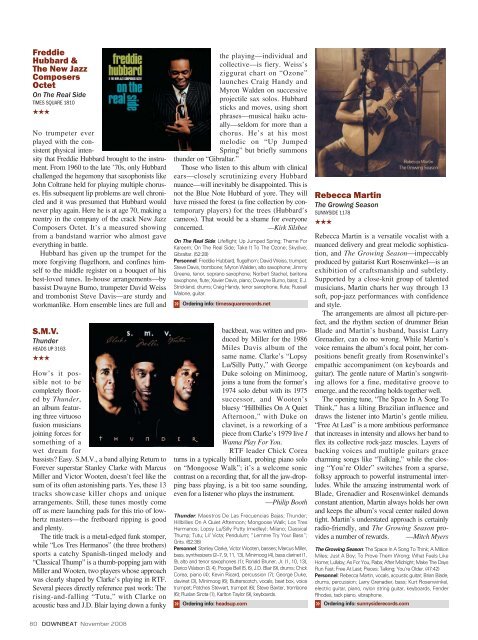Download - Downbeat
Download - Downbeat
Download - Downbeat
- No tags were found...
You also want an ePaper? Increase the reach of your titles
YUMPU automatically turns print PDFs into web optimized ePapers that Google loves.
FreddieHubbard &The New JazzComposersOctetOn The Real SideTIMES SQUARE 1810AAANo trumpeter everplayed with the consistentphysical intensitythat Freddie Hubbard brought to the instrument.From 1960 to the late ’70s, only Hubbardchallenged the hegemony that saxophonists likeJohn Coltrane held for playing multiple choruses.His subsequent lip problems are well chronicledand it was presumed that Hubbard wouldnever play again. Here he is at age 70, making areentry in the company of the crack New JazzComposers Octet. It’s a measured showingfrom a bandstand warrior who almost gaveeverything in battle.Hubbard has given up the trumpet for themore forgiving flugelhorn, and confines himselfto the middle register on a bouquet of hisbest-loved tunes. In-house arrangements—bybassist Dwayne Burno, trumpeter David Weissand trombonist Steve Davis—are sturdy andworkmanlike. Horn ensemble lines are full andS.M.V.ThunderHEADS UP 3163AAAHow’s it possiblenot to becompletely flooredby Thunder,an album featuringthree virtuosofusion musiciansjoining forces forsomething of awet dream forbassists? Easy. S.M.V., a band allying Return toForever superstar Stanley Clarke with MarcusMiller and Victor Wooten, doesn’t feel like thesum of its often astonishing parts. Yes, these 13tracks showcase killer chops and uniquearrangements. Still, these tunes mostly comeoff as mere launching pads for this trio of lowhertzmasters—the fretboard ripping is goodand plenty.The title track is a metal-edged funk stomper,while “Los Tres Hermanos” (the three brothers)sports a catchy Spanish-tinged melody and“Classical Thump” is a thumb-popping jam withMiller and Wooten, two players whose approachwas clearly shaped by Clarke’s playing in RTF.Several pieces directly reference past work: Therising-and-falling “Tutu,” with Clarke onacoustic bass and J.D. Blair laying down a funkythe playing—individual andcollective—is fiery. Weiss’sziggurat chart on “Ozone”launches Craig Handy andMyron Walden on successiveprojectile sax solos. Hubbardsticks and moves, using shortphrases—musical haiku actually—seldomfor more than achorus. He’s at his mostmelodic on “Up JumpedSpring” but briefly summonsthunder on “Gibraltar.”Those who listen to this album with clinicalears—closely scrutinizing every Hubbardnuance—will inevitably be disappointed. This isnot the Blue Note Hubbard of yore. They willhave missed the forest (a fine collection by contemporaryplayers) for the trees (Hubbard’scameos). That would be a shame for everyoneconcerned.—Kirk SilsbeeOn The Real Side: Lifeflight; Up Jumped Spring; Theme ForKareem; On The Real Side; Take It To The Ozone; Skydive;Gibraltar. (52:28)Personnel: Freddie Hubbard, flugelhorn; David Weiss, trumpet;Steve Davis, trombone; Myron Walden, alto saxophone; JimmyGreene, tenor, soprano saxophone; Norbert Stachel, baritonesaxophone, flute; Xavier Davis, piano; Dwayne Burno, bass; E.J.Strickland, drums; Craig Handy, tenor saxophone, flute; RussellMalone, guitar.»Ordering info: timessquarerecords.netbackbeat, was written and producedby Miller for the 1986Miles Davis album of thesame name. Clarke’s “LopsyLu/Silly Putty,” with GeorgeDuke soloing on Minimoog,joins a tune from the former’s1974 solo debut with its 1975successor, and Wooten’sbluesy “Hillbillies On A QuietAfternoon,” with Duke onclavinet, is a reworking of apiece from Clarke’s 1979 live IWanna Play For You.RTF leader Chick Coreaturns in a typically brilliant, probing piano soloon “Mongoose Walk”; it’s a welcome soniccontrast on a recording that, for all the jaw-droppingbass playing, is a bit too same sounding,even for a listener who plays the instrument.—Philip BoothThunder: Maestros De Las Frecuencias Bajas; Thunder;Hillbillies On A Quiet Afternoon; Mongoose Walk; Los TresHermanos; Lopsy Lu/Silly Putty (medley); Milano; ClassicalThump; Tutu; Lil’ Victa; Pendulum; “Lemme Try Your Bass”;Grits. (62:38)Personnel: Stanley Clarke, Victor Wooten, basses; Marcus Miller,bass, synthesizers (2–7, 9, 11, 13), Minimoog (4), bass clarinet (1,9), alto and tenor saxophones (1); Ronald Bruner, Jr. (1, 10, 13),Derico Watson (3, 4), Poogie Bell (5, 6), J.D. Blair (9), drums; ChickCorea, piano (4); Kevin Ricard, percussion (7); George Duke,clavinet (3), Minimoog (6); Butterscotch, vocals, beat box, voicetrumpet; Patches Stewart, trumpet (6); Steve Baxter, trombone(6); Ruslan Sirota (1), Karlton Taylor (9), keyboards.Ordering info: headsup.comRebecca MartinThe Growing SeasonSUNNYSIDE 1178AAARebecca Martin is a versatile vocalist with anuanced delivery and great melodic sophistication,and The Growing Season—impeccablyproduced by guitarist Kurt Rosenwinkel—is anexhibition of craftsmanship and subtlety.Supported by a close-knit group of talentedmusicians, Martin charts her way through 13soft, pop-jazz performances with confidenceand style.The arrangements are almost all picture-perfect,and the rhythm section of drummer BrianBlade and Martin’s husband, bassist LarryGrenadier, can do no wrong. While Martin’svoice remains the album’s focal point, her compositionsbenefit greatly from Rosenwinkel’sempathic accompaniment (on keyboards andguitar). The gentle nature of Martin’s songwritingallows for a fine, meditative groove toemerge, and the recording holds together well.The opening tune, “The Space In A Song ToThink,” has a lilting Brazilian influence anddraws the listener into Martin’s gentle milieu.“Free At Last” is a more ambitious performancethat increases in intensity and allows her band toflex its collective rock-jazz muscles. Layers ofbacking voices and multiple guitars gracecharming songs like “Talking,” while the closing“You’re Older” switches from a sparse,folksy approach to powerful instrumental interludes.While the amazing instrumental work ofBlade, Grenadier and Rosenwinkel demandsconstant attention, Martin always holds her ownand keeps the album’s vocal center nailed downtight. Martin’s understated approach is certainlyradio-friendly, and The Growing Season providesa number of rewards. —Mitch MyersThe Growing Season: The Space In A Song To Think; A MillionMiles; Just A Boy; To Prove Them Wrong; What Feels LikeHome; Lullaby; As For You, Raba; After Midnight; Make The DaysRun Fast; Free At Last; Pieces; Talking; You’re Older. (47:42)Personnel: Rebecca Martin, vocals, acoustic guitar; Brian Blade,drums, percussion; Larry Grenadier, bass; Kurt Rosenwinkel,electric guitar, piano, nylon string guitar, keyboards, FenderRhodes, tack piano, vibraphone.» Ordering info: sunnysiderecords.com»80 DOWNBEAT November 2008
















